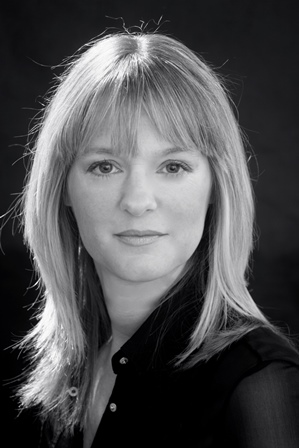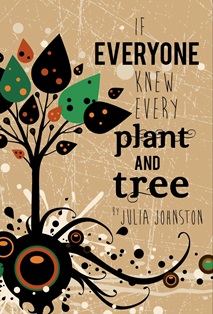The first in a series of five blog posts by Julia Johnston (author of If Everyone Knew Every Plant And Tree), charting her journey from preparing to submit her manuscript to agents, through to the self-publishing of her debut novel.

“Time’s up. Put your pens down.”
“Noooooooooooooo!”
Handing in an unfinished test paper. To be scrutinised by an examiner. The frustration, the humiliation, the distress. It wasn’t ready to be read.
That’s all behind us, is it not? There’s no one wrenching our manuscripts from our hands or pointing manically at their watch. We have the luxury of time. But it’s not as simple as that. We need to be finished before submitting our work to a literary agent or a publisher or a literary consultant or even a friend.
How do we know if our novel is ‘finished’ though? How do we know it’s ready to be read?
If you’re like me, you’ll have gone through/be going through your work with a fine-tooth comb, and a spade, and a shovel. The trouble is, you don't know how sharp your tools are. You need guidance on honing your work to the best of your ability.
My quest for guidance saw me read through dunes of books, articles, websites and blogs. I trudged through them all, longing to feel finished, to arrive at the open sea (‘the end’) with my manuscript a sea-worthy vessel. This meant arduously going over and over my work, revising and editing and revising. Only then, only after all of that work, should someone read your manuscript.
But what of your readers’ suggestions? What then? What if they read the whole thing, and they criticise every aspect of it? What do we do? Do we respond like this?
“Well, yes, I mean, I knew that really. I meant to change that bit… add something else in there… get rid of that section. Yes and of course I wasn’t at all sure about the title, and yeah I’ve really gone off the name of the main character and I was going to make him quite a bit nicer, to be honest. And well, I’m not stupid: I knew there were tons of piddly little mistakes, but the editor’s supposed to sort them out. I mean I’m not going to clean my house before the cleaner comes, am I?”
Not quite. We should alter, delete, insert, wherever it seems appropriate to us. Others won’t agree with our alterations, deletions and insertions, but we have to make those decisions. And it doesn’t matter if we’re not sure, as long as we have good reasons for them.
But a fine balance needs to be struck. We should not be too sure of ourselves. Our reader may have a point — something that hadn’t occurred to us. This might lead to a response more like,
“Ah, okay. Thanks for that. That’s a good point. Yeah, that sounds better. No, that doesn’t sound right. I agree, ‘Rona’ instead of ‘Rhoda’; that would work well. Rona Booke, not Rhoda Booke. And, sure, I did like my title for the book on Rhoda’s… sorry Rona’s trawl of public conveniences, ‘To Pee or Not to Pee’, but I like yours too — ‘Britain’s Bogs – The Best and Worst of Public Toilets’.”
But what about you, fellow writers? Have you ever wrestled with a change prompted by feedback from one of your beta readers? 
Writing tips:
TIP 1
The Three Cs
Corrections should be Conscientious yet Confident.
TIP 2
The Three Fs
It is normal to Feel Frightened when you decide you’re Finished.
TIP 3
The Three Ds
Expect to be Disappointed, but learn to Discriminate between fact and opinion and remain Determined.
[More on TIP 3 in the second blog post regarding literary agent submissions…]
Some suggested reading:
One of the ‘dune-books’ I read was How Not To Write A Novel by Sandra Newman and Howard Mittelmark; a jocular jaunt into the fundamentals of writing a worst-seller, a useless yarn, a stinking story (can’t remember if they mention over-use of alliteration). It proved both helpful and hilarious, but potentially heart-sinking too for the would-be novelist. The authors take perverse delight in concocting passages of the kind they say they regularly encounter, to exemplify their warnings. Though it verges on malicious at times, I would still recommend this book to, well, anyone really, despite its subtitle, 200 Mistakes To Avoid At All Costs If You Ever Want To Get Published — religiously following every suggestion is hardly feasible or necessarily prudent.
Suggested blog – written by author of over ninety books, the wonderful Nicola Morgan.
Next time…
You’ve decided your work is ready to be read (yippee, amazing, well done, what a relief); you have your honed manuscript under your arm, you have donned your cap, you have set off to deliver it… but which doorstep do you leave it on? And who will answer the door? And what the dickens are they going to say about all them wonderful words what you’ve wrote?!
Julia’s background is in acting and teaching (French, piano, deaf children). She is currently writing the sequel to her debut novel and a non-fiction book on self-publishing.
Find out more about Julia on her website and follow her on Twitter. Find out more about her debut novel here. You can also find her on Goodreads.
I'm never happy about anything I write but I've now reached the stage where I feel confident about the first section of my novel. This has been an epiphany for me because I've never felt that way before. Its given me a boost. I'm tackling the long exhausting editing process with renewed vigour. I still have much editing to do and a few scenes to add but I have the utmost belief n my novel.
Great comment, Adrian! Spot on that you drive home the importance of editing and sounds like you've been wonderfully diligent in that respect.
Everything you say makes sense, though I do believe some writers are planners and some aren't. Perhaps working in certain genres like 'crime' or 'fantasy' requires more careful planning; mine is contemporary fiction and I prefer to go with the flow. However, I do tabulate by chapter/page number as I go along, under the headings, 'setting', 'characters featured/character development', 'Action/turning points', and 'Themes/language'.
I particularly agree that it's important to aim at ending each chapter with a 'cliff-hanger', however low or not particularly treacherous the cliff. It goes some way to creating that page-turning effect to which we all aspire. Moreover, it's an element which can be added easily. Here are some examples of chapter endings from 'If Everyone Knew Every Plant And Tree'...
'In fact, shortly after Nathan ran away, I missed a whole week of school... and all I'll say at this point is that it wasn't because I was ill.'
'I slid the lock open just as we were pulling into the station, now brimming with anxiety over what punishment lay in wait for us.'
'A few dogs. A few dodgy-looking characters. I spotted a bench and went to sit down. When I crossed my legs, I felt my foot shaking, so I flung it onto firm ground. Was I going to sleep here? Seemed safe enough.'
None of these chapter endings are earth-shatteringly dramatic, but there's just enough suspense created to keep the readers' interest (I hope!).
Good luck with your writing and remember to share some of it if you haven't already! It will be a great confidence-booster and it's amazing what other folk spot in your work that you've missed...
I must have done over twenty edits. Editing has been an exhausting, but enlightening process. In the beginning, I thought that each subsequent edit would be much easier. I was wrong. But after each subsequent edit my novel was tighter and pacier.
During my edits I discovered many weaknesses: repetition, shoes and socks problems, clunky sentences, poor grammar and punctuation, missing signposts, unsuitable chapter titles, chapters that ended without a hook or cliff-hanger, 60,000 words of superfluous text, lengthy descriptions, and dialogue that needed much improvement.
Hemingway was right, ‘The first draft of everything is always shit.’
I have learnt much from the process of writing my first novel. I believed I had a firm grasp of the aspects of the novel, but knowing how to best orchestrate them was another matter.
The most important lesson I learned is to thoroughly plan from the outset. If I had planned better, I would have saved myself considerable effort and time.
I still have much more work to do.